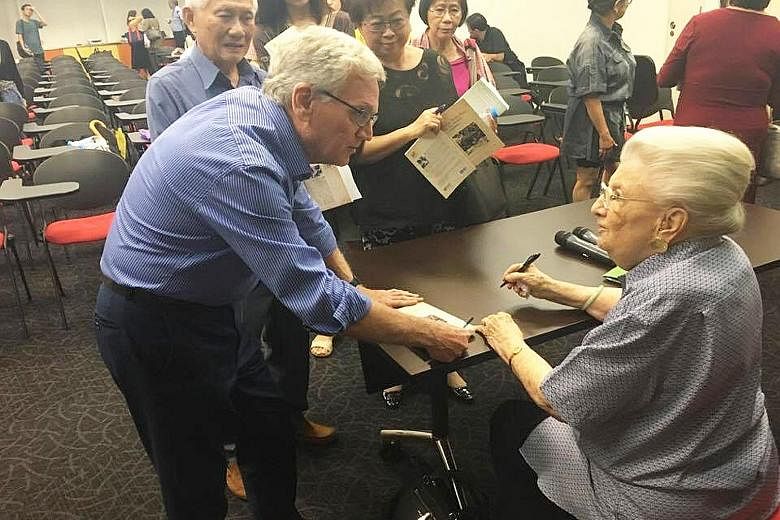With more people living longer these days, governments everywhere are wringing their hands over how to manage what is known as the silver tsunami, from the growing pool of elderly people here and elsewhere, even as birth rates fall.
But pioneering social work educator Ann Wee, 90, says that is not the real worry.
What everyone should focus on instead are chronic diseases that creep up on most people from the age of 40, the sprightly 90-year-old said to 90 readers at The Big Read Meet on Wednesday evening .
"Don't talk to me about old age health," she stressed. "Talk to those in their 40s and 50s who don't seem to have symptoms of chronic illnesses. Get your blood pressure, cholesterol and blood sugar checked regularly; we need to be aggressive about that."
This struck a chord with the audience, whose ages ranged from 19 to 90.
Retiree Alice Tan, 66, said: "I agree completely with you. I see more and more people in their 20s and 30s getting strokes."
She volunteers at the Singapore National Stroke Association, the main support group for stroke survivors and caregivers here.
Mrs Wee, who came to Singapore 66 years ago and is now a Singaporean, was at The Straits Times' monthly non-fiction book club to take questions on her just-launched memoir, A Tiger Remembers: The Way We Were In Singapore.
The book, which the English- woman wrote to capture facets of Singapore society left out of history books, is about her experiences in adapting to life in a middle-class Singaporean Chinese family while looking after the welfare of slum-dwellers, guiding her social work students and protecting the interests of vulnerable women and children.
Among many other things, she headed the University of Singapore's Department of Social Work from 1968 to 1986 and retired from social work in 2009.
Former Straits Times editor- in-chief Peter Lim, 78, asked what she thought of Singaporeans who put their elderly relatives in nursing homes in Johor.
Mr Lim also said a BBC Radio show earlier this week had highlighted that Western families were now sending their aged relatives to nursing homes in Thailand because they were cheaper than such homes in Europe, and nurses there took care of their charges as if they were their own grandparents.
Mrs Wee, a widow with two daughters, replied: "I have no experience to go on by for this, but Johor is almost Singapore, and families go to the end of their tether in caring for the elderly, especially if they have dementia... Professor Kua Ee Heok (a senior consultant psychiatrist at the National University Hospital) said physical illness is less stressful on caregivers than mental illness because with the mental aspect, the person becomes somebody else almost... So I would not judge families who resort to such nursing homes."
Meet regular Ken Hickson, chairman of sustainability consultancy Sustain Ability Showcase Asia, asked Mrs Wee how social work here could be improved.
Noting that the Government was "doing wonders for kids with special needs", she wished that society would stop placing the burden of caring for special-needs children on their siblings.
•A Tiger Remembers: The Way We Were In Singapore by Ann Wee, $19.90 a copy with GST, is available at leading bookstores here.
The next Big Read Meet will be on Michael Lewis' new book, The Undoing Project. Join senior writer Cheong Suk-Wai to discuss it on Jan 25 from 6.30pm at the Central Public Library, Basement 1, at 100 Victoria Street.


